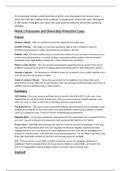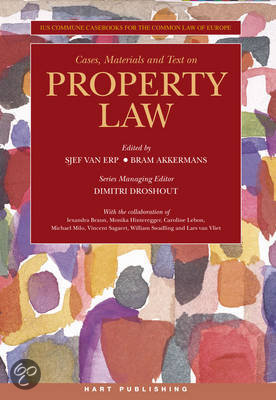This document involves a brief overview of all the cases discussed in the lectures and a
select few from the reading of the casebook. It should cover most of the cases that appear
in the exams. It also goes over when the cases could be useful for answering a particular
question.
Week 2 Possession and Ownership Protection Cases
France
Harhouz v Kherif – Rules on possessory protection apply to immovables only.
Cornille v Pierson – The holder of a servitude granting a right of way is entitled to ward off
interference by possessory action. Restoration for servitude is allowed.
Pelletier v SCI – The mere performance of construction works on one’s land does not amount to an
interference with possession. An action causing a disturbance which conflicts with the peaceful
possession of the right holder is needed for a claim of possessory protection.
Hellot v Leclerc Morlet – This case protects ownership by suggesting that an owner of the land is
entitled to request the removal of a building which encroaches onto his land without his consent.
Houssin v Legrasse – The landowner is entitled to claim the removal of a fence which extends 0.5cm
onto his land, but not an abuse of rights.
Camys et Lavoye v Mercier – France has special torts in the neighbour law. Ownership can be
protected by forcing a disturber to pay damages. Here the claimants wanted damages due to loss of
sunlight and noise pollution from a nearby factory.
Germany
OLG Koblenz – This case concerns self-help which is found in the BGB at 859. In this case, it was
decided that you can only resort to besitzwehr after you have tried more modest remedies. Even
when you have to resort to this form of self-help it must be proportionate.
The Removed Car – This case is used to determine whether the besitzkehr form of self-help is done
lawfully. Removing the car four hours after it has been parked is lawful but according to a Munich
court, it is unlawful to wait 7 hours to remove something placed unlawfully.
Disputed Horse – If you have a possessory claim launched from a possessor and a counterclaim from
an owner, you are to disavow the possessory claim and grant the claim from the owner.
Frozen Vines – 1004 BGB which concerns the right to a claim for removal or injunction. In this case,
they said that the provision does not cover negative interference. Negative interference being
damage that does not occur because of human behaviour as in this case cold air damaging vines
because of a blocked drain. 1004 BGB only covers human behaviour. You are liable if you fail to take
financially reasonable measures to prevent such damage based on 242 BGB.
Fire – A house owner is responsible as indirect interferer for the fire damages suffered by a
neighbour if the fire emanated from his house due to a failure in responsibility on his part. This
failure in responsibility could be failing to keep his electrics in good working order.
England
,McPhail v persons (165) – The owner of a house occupied by squatters may use reasonable
force to turn them out without the aid of the courts of law or apply for an order for
possession. The courts should be involved to reach a peaceful solution but the courts cannot
give rights to an illegal person such as the squatter. Article 8 cannot be applied in disputes
like this one.
Asher and wife v Whitlock (167) – You cannot possess without a title.
Anchor Brewhouse v Berkley House (169) – Trespass requires unauthorised or otherwise
unjustified entry into, or interference with, another’s land. This includes hanging a crane
into somebody else’s airspace. If you have the land, then you can sue for damages against
all intruders.
Shelfer v City of London Electric Lighting Company (171) – Damages may be a more suitable
measure than an injunction if the injury to the claimant's legal rights is small (1), the
damages are capable of being estimated in money (2), the damage can be adequately
compensated by a small money payment (3), where it would be oppressive to the defendant
to grant an injunction (4).
Hunter v Canary Wharf (162) – This case is useful for ascertaining who has the right to sue
for nuisance. Negative interference does not constitute an actionable private nuisance. Only
they who have the right to exclusive possession of the land have the right to sue in
nuisance. Damages for nuisance are measured in value lost in the land be it financial,
amenity or quiet enjoyment.
St Helen’s Smelting v Tipping (181) – This case is useful when facing questions over whether
somebody can launch a claim in nuisance. You have two types of nuisance: interference
causing damage to property and interference causing damage to personal comfort. It is
important to note that not every nuisance is actionable as evidenced by this line “Whether
that may or may not be denominated a nuisance, must undoubtedly depend greatly on the
circumstance where the thing complained of actually occurred. If a man lives in a town, of
necessity he should subject himself to the consequences of those operations and trade
which he may be carried on in his immediate locality, which are actually necessary for trade
and commerce, also for the enjoyment of property, and for the benefit of the inhabitants of
the town and the public at large”. If you choose to set up in an industrial area do not be so
surprised if you experience the consequences of factory work on your property. Do also
consider this line “In order to establish a right by prescription, a person must show at least
20 years uninterrupted enjoyment as of right.” If the circumstances have shown a particular
behaviour taking place such as factory work for those 20 years in an area, then the factories
can continue with that work.
Leakey and Others v National Trust (184) – This case is useful when facing a question over
situations where nuisance arises because of a natural event. It was decided here that
liability under nuisance does not cover harm caused by mere natural events, but the
landowner is under a duty if he knew or ought to have known of the risk, to do what was
reasonable in all circumstances to prevent or minimise the risk of the known or foreseeable
damage or injury to the other person or his property, and is liable in nuisance if he did not.
,Harris v James and another (189) – This case is useful when facing a question concerning
leased land. It was decided here that the landlord is liable for any mischief that arises from
the natural and necessary result of what the landlord authorised and required, or even
authorised and did not require.
Armory v Delamirie (201) – This case is to be used in a situation where one comes across
the property of another. According to the court, a finder of an object such as a jewel can
keep against all but the rightful owner.
Costello v Chief Constable of Derbyshire Constabulary (202) – Possession of an object gives
the possessor a title to which he shall be protected in law against interference with that
right.
Week 3A Property Rights in Civil Law and Common Law Countries
England
Rosenborg v Cook (308) – This case is useful for considering an important common law
principle in property law. That possession is the root of every title.
Hill v Tupper (302) – This case is evidence of the numerus clausus principle being evident in
English law. It is not competent for individuals to add to the list of property rights
recognised by the law.
Tulk v Moxhay (305) – This case could be useful in a potential question asking you whether
the principle of numerus clausus is adhered to. It is an English case which stated that a
covenant restrictive of the user of the land is capable of binding strangers to its creation.
This seems at odds with the judgement in Hill v Tupper.
Star Energy Weald Basin Ltd v Bocardo SA (313) – This is useful as a trespass case. Imagine
a situation where you have a mining company digging for diamonds and they dig beneath
your garden. Whilst your use of the garden is still undisturbed, the mining company are still
committing trespass.
Lace v Chandler (316) – This is a case concerning leases. For a lease to be valid, there must
be a certain term as to the length of the lease. The reasoning was reaffirmed in the case of
Prudential Assurance Co Ltd v London Residuary Body on 317.
Re Ellenborough Park (319) – This case is useful for seeing when a right can be an
easement. There are four elements to this. Firstly, there must be a dominant and servient
tenement. Secondly, the right must accommodate the dominant tenement, and this is to say
that the right must have a direct beneficial impact on the dominant tenement. You could
see this from an increase in the value of the dominant tenement. Thirdly, there must be a
, diversity of ownership regarding ownership/occupation. You cannot have an easement over
your own land. Fourthly, the right must be capable of lying in grant and this is to say that it
fulfils the three elements of 1) the owners of the lands being capable to give easements, 2)
capable of being explained and 3) be recognised as falling within the general categories of
rights.
Germany
The Safety Bridges (246) – Real servitudes are the encumbrance of the servient land with a
burden for the benefit of the dominant land. They must be negative in content and by that it
is meant that the owner of the servient land must tolerate or refrain from doing something.
Here the court said that a positive duty may be connected to a right of servitude as a
secondary duty. This case is useful for determining whether the content of the servitude is
allowed.
Heat and Water Supply (271) – This case is for determining the content of the German
specific right called the real burden. As per the words of the court here, the contents of a
real burden can only be a positive act of giving or doing.
Holiday Apartment (265) – This case is useful for determining whether a limited personal
servitude has been validly established. Here the court has said that it is the content of the
servitude which determines whether a limited personal servitude is validly established and
not the lack of information of the claimant. Accordingly, the restrictions on the content of
real servitudes apply also to limited personal servitudes and this includes, the servitude
resting on land and that it be negative in its obligation.
France
SARL Le Grand Verger v Widow Cozon and others (259) – This case concerns the right of
usufruct and it could be useful for questions in which the object subject to the right of
usufruct is different at the end of the period to what it was at the start of the period and
determining what can be done to rectify such a situation. In its judgement, the court stated
that the holder of a right of usufruct is obliged to manage the object carefully and to
preserve the nature of the object. One could imply from this that the holder of the usufruct
is obliged to take out insurance on the object.
Netherlands
Failure to Notify (275) – You would use this case if you were facing a situation concerning
the emphyteusis property right in the Netherlands. The Hoge Raad held that in Dutch law
buildings constructed by the holder of an emphyteusis become part of the ownership of the
owner of the land and not the emphyteuticarius (holder of the right of emphyteusis).
Week 3B Transfers and Third-Party Protection






